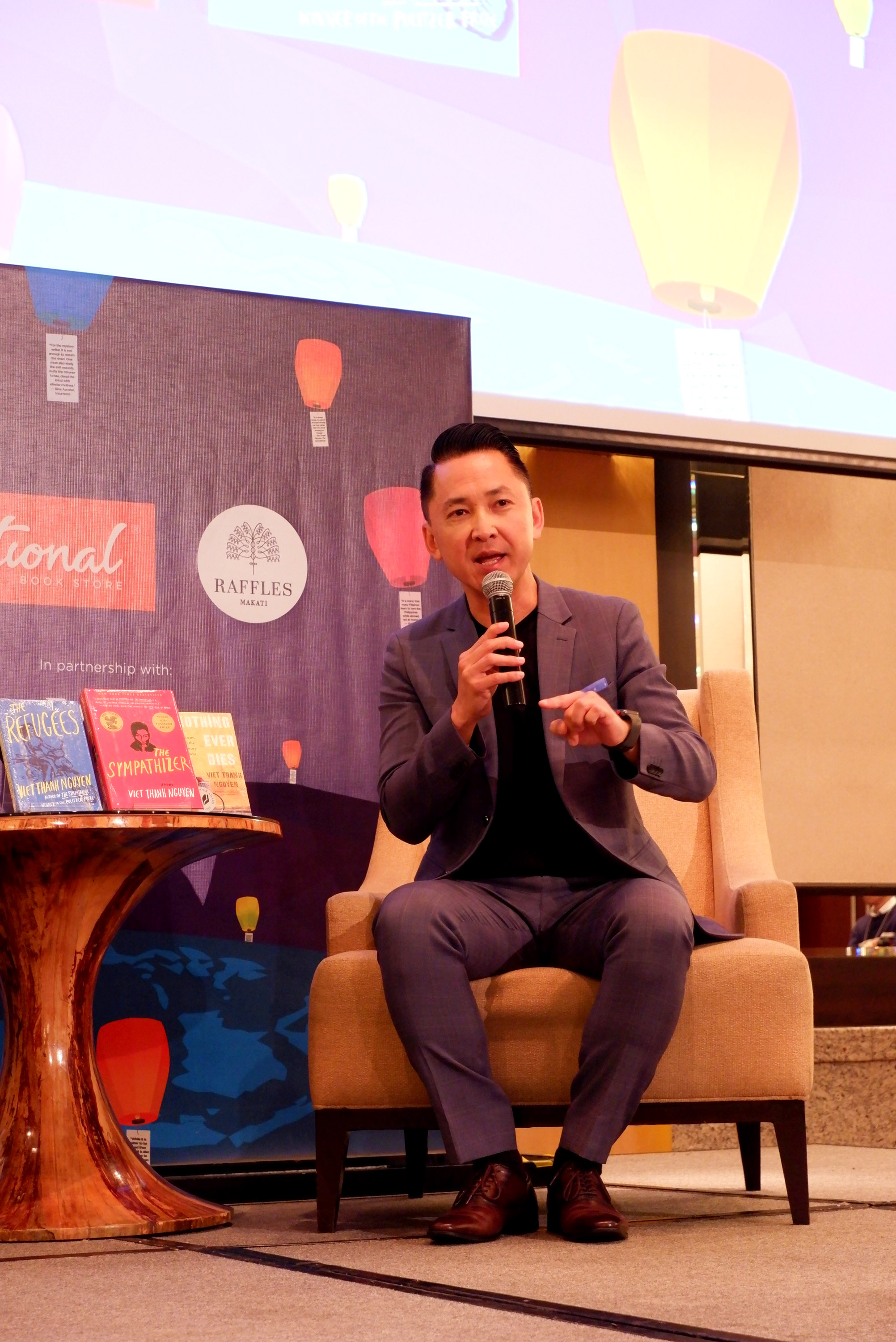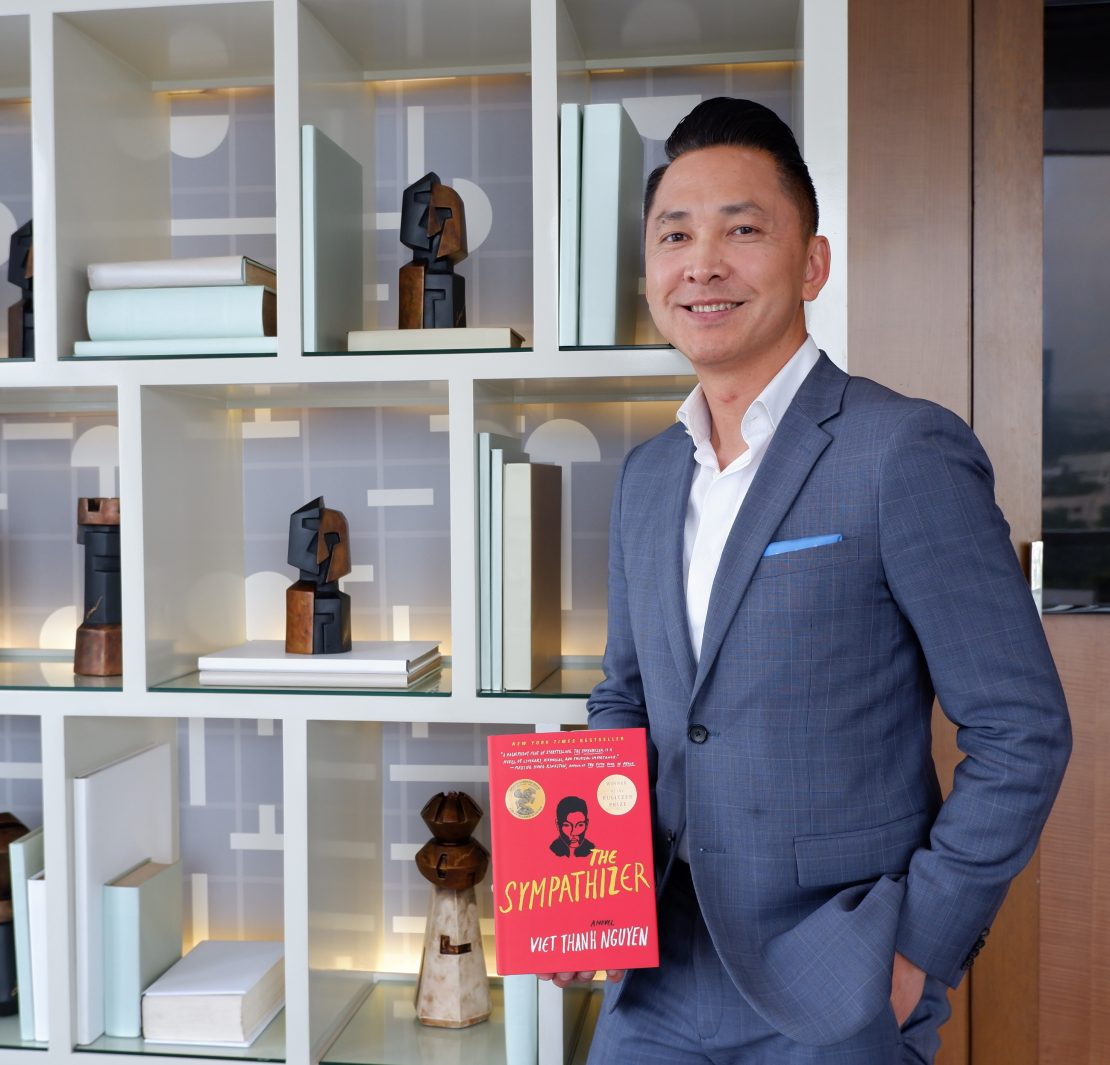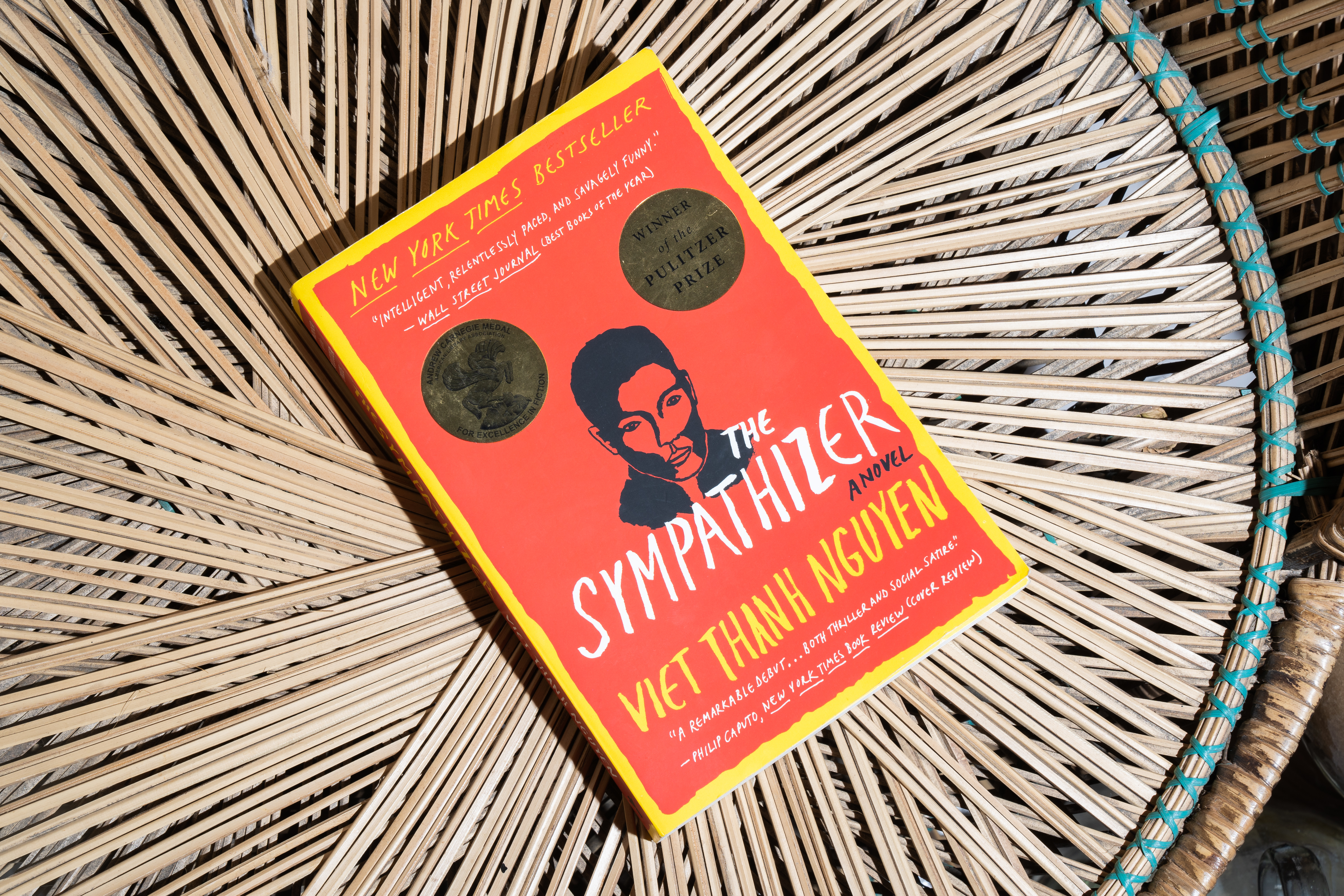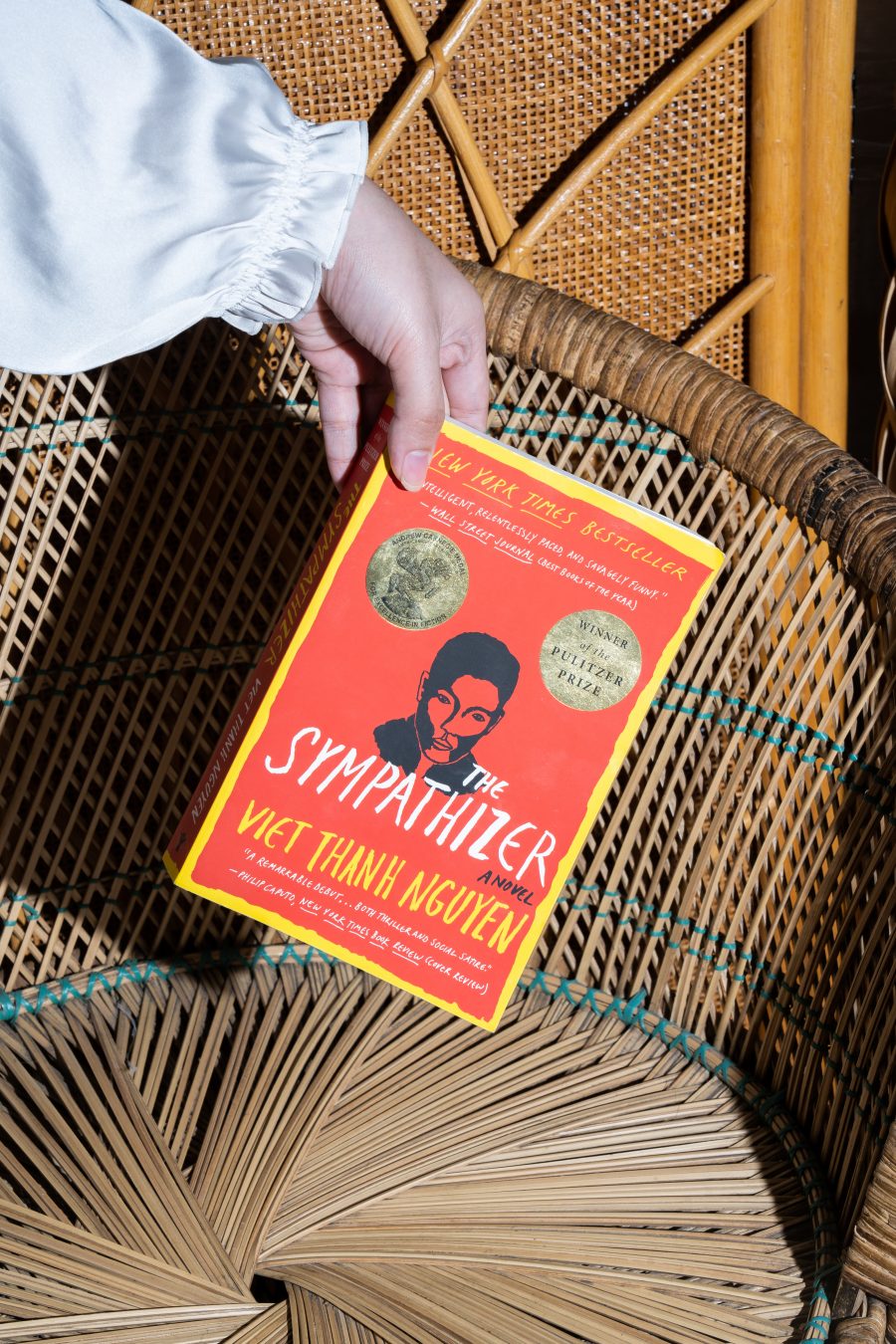In history classes, we’re taught one important thing before anything else: History is written and shaped by the winners. It’s a sacred, if simplistic, statement that summarizes how learning history isn’t just about facts but narratives, that we’re parceling out human history.
It’s also not true, at least in the case of one specific war. As the Vietnamese-American writer Viet Thangh Nguyen puts it: “With the Vietnam war, the losers were able to control the narrative.” (Here’s an incendiary statement: In this day and age, being white and privileged trumps winning a war.) That’s exactly why his Pulitzer-winning debut novel The Sympathizer is as radical as it is, since it deliberately overtakes the traditional narratives of the war.
Last Saturday, Nolisoli.ph sat down with the writer to talk about The Sympathizer, his new short story collection The Refugees, and the importance of writing stories about marginalised narratives.
What was it like winning a Pulitzer for The Sympathizer?
It was great for me for obvious personal and professional reasons, but it was also kind of a shock because there was no warning. I think it took me a year to just get over the shock. The Pulitzer really disrupted my life. That was the negative side of it, I couldn’t get any writing done because there were so many demands on my time as a result of that. I think after that year, then the reality sunk in with the sense that my work would be read differently because of the Pulitzer. I would be looked at differently. I could either run away from that or embrace that. Or take that as an opportunity to talk about things that are important to me and my writing.
Very important question: What’s it like being in the Philippines?
It’s great! The Philippines was the country I most wanted to visit. Filipino-American literature was crucial to me, with people like Carlos Bulosan, Jessica Hagedorn, and others. My novel The Sympathizer also has a section set in the Philippines, which I wrote without ever visiting the Philippines, so I wanted to see if the reality is different from the novel.
Why was Filipino-American literature important to you?
I think that the Filipino-American literature that exists in the United States is concerned with the things that I’m concerned about: How to be a writer who’s concerned about making art that isn’t only just about art but also about politcs and labor and revolution, things that obviously Bulosan and Hagedorn have thought about.
Your works often center around refugee narratives. I understand that you were a refugee of the Vietnam War yourself?
My family was on the losing side of the Vietnam War. So in 1975, when the war ended, we had to flee as refugees along with hundred thirty thousand other South Vietnamese people. We eventually ended up in United States in a refugee camp. What that means is that our existence as refugees is inseparable from the history of war, which is also inseparable from the history of colonization.
Basically, I tried to offend everybody.
So the experience of being a Vietnamese refugee was fundamental in shaping me and my family. My earliest memories actually began in this refugee camp when I’m separated from my parents for a few months. That was a traumatic experience that I spend a lot of time trying to forget, but as a writer, you try to remember the things that you forget. And so that’s one of the reasons why I’ve written a lot about refugees and war because they’re fundamental experiences for me. But also I think they’re fundamental experiences for most of the world, as well.
How does that experience inform your writing? It obviously shapes the content of your writing, but what about how you write?
There’s a big difference between The Refugees and The Sympathizer. In The Refugees, how I wrote was simply I wanted to write about Vietnamese people and refugees who I felt were sort of neglected and erased in American literature—that meant that I resorted to mostly realism in those stories.
In The Sympathizer, I wanted to do something different because I did not simply want to write about the experience of Vietnamese refugees. Of course, I continued to do that, but I also wanted to challenge American culture and politics itself through the experience of refugees, both people I was writing about and my own experiences. So it was a more ambitious, aggressive novel. And one way it manifests is through how the book is written as something that is very critical of the United States. It’s also very critical of Vietnamese communism and anti-communists. Basically, I tried to offend everybody.
But just in terms of the United States, refugees are only expected to be grateful for being rescued. But there’s a lot in the novel where my spy says, “Yeah, I’m grateful to be rescued by the United States but maybe I won’t need to be grateful to be rescued if we hadn’t been bombed and invaded by United States in the first place.” That’s something that most Americans have never heard and many of them have a problem hearing.

So The Sympathizer was a response or an attack to the American-centric view of the Vietnam war?
It is definitely an attack. I’ve read a lot of American accounts on the Vietnam war, fiction and non-fiction and seen many, many movies. I think the reason why this is important outside of the United States is that America is a global power. Not just politically, military, economically, but culturally, too. So American stories [have] influence all over the world. And as far as I know, it’s the first war where the loser, that’s the United States, got to write the history of the war through cultural power, and so it was very important to attack American culture as a way of decentering these American narratives.
I also knew I had one advantage in being an American writer versus being a Vietnamese writer, which is if I wrote in Vietnamese and published in Vietnam, no one would read my books outside of Vietnam. But if I wrote as an American writer and became successful, my books have a chance of being published and translated all over the world, which is what has happened. So the ambition of The Sympathizer wasn’t simply to tell the story of the Vietnamese people, it was also to attack the way their stories have been told or not told by Americans and in that way make a change globally as well.
So it’s also an attack against being “othered?”
Right. I guess the irony when you look at this is in fact, people who are “othered” are not always cognizant of how they erase other people. So for example, a lot of the American soldiers who wrote about the war in fact felt themselves to be “othered”. They felt that they suffered a lot and they were misunderstood by the American population. So the whole identity of the American soldier is kind of an Other identity, too. But it’s not a surprise that people who have been misunderstood can turn around and misunderstand others. It’s quite a human impulse.
I guess the irony when you look at this is in fact, people who are “othered” are not always cognizant of how they erase other people.
Your works deal a lot with ideology. What do you think about the ideology war that’s playing around the world?
Whether we’re talking about the Philippines or the United States or Vietnam where there are either very authoritarian leaders or parties in control, I think we’re seeing a moment where governments and leadership are sort of fearful of actual democracy. It’s different from populism [which involves] riling up people in order to carry out authoritarian objectives. And I think that in the case of Vietnam, the United States, and maybe other countries, oftentimes what we see are there are deep rooted contradictions that are fundamental to these countries that erupt through the return to political authoritarianism.
So in the United States, we had President Obama, now we have President Trump. Well, Obama is one half of American culture, which is liberal, inclusiveness, and tolerance. The other half of American culture is white nationalism and white supremacy and racism. Both of these things have been part of American culture since the beginning—a fundamental contradiction. And it’s one the United States has not resolved and that Donald Trump and his supporters are trying to resolve in one direction by returning to the more racist and nationalist roots of the country.
In Vietnam, and this is what The Sympathizer deals with, the irony is that we had a revolution, fought for freedom and independence, and now you have a country that’s technically independent but not really free, a country that actually suppresses its people as much as foreign occupiers did. That’s the contradiction that is really fundamental to what’s happening in Vietnam today.
It’s a contradiction that seems really familiar here.
Yeah, I would assume so.
So in this kind of landscape, what is literature’s place?
Literature’s place is what it’s always been, which is to tell the truth. Our job as writers is to tell the truth about human beings and to convey their stories in a way that’s interesting. And when you tell the truth, unfortunately a lot of people don’t want to really know the truth about themselves and their society. That’s what I mean when I say The Sympathizer is designed to offend everybody. The reason why it’s going to offend everybody is not because I’m just doing it to be malicious, it’s because when you speak the truth about a culture, it’s oftentimes the truth that’s embedded upon a contradiction that people want to deny.
So for example, I think the book potentially offends a lot of Americans because it says America’s not as great a country as you think it is. It’s the country that has the American dream but also an imperialist country that bombs a lot of other countries. Americans have a hard time confronting that reality.
Or in the case of my own people, Vietnamese refugees, who are deeply anti-communist for the most part. For them, the truth is that communists are terrible. If I just said that, they’d be happy with me. But I wrote a novel from the perspective of a communist spy. And many Vietnamese refugees refuse to read my book just because of that. And they don’t want to confront one of the truths that the book talks about, which is that it wasn’t just the communists who did terrible things. Our side did terrible things, too. That’s a truth that many people do not want to confront.
What do you think about the backlash against the rise of multicultural literature, literature that’s written by minority writers?
One of the reasons why literature is important in this example is that literature can’t be isolated from the rest of society. And by that I mean it’s both the stories that literature tells but also the people who are involved in the literature: the writers, the publishers, the industries.
The backlash against multicultural literature is a backlash against multicultural America and the sense—the wrong sense—that with writers of color being recognized and people of color are gaining more political power, that this is a zero sum game where white people are going to lose out. I think that’s wrong.
That is the underlying motivation behind the backlash, a sense that we are fighting for a small piece of the pie when actually what we should really be imagining is a more just society where there’s more opportunities for everybody whether we’re talking about politics or economics or whether we’re talking about literature. In that sense, the success of minorities, refugees, immigrants, people of color, in the larger society or in literature enriches the country rather than threatens one population.
…The Sympathizer is designed to offend everybody. The reason why it’s going to offend everybody is not because I’m just doing it to be malicious, it’s because when you speak the truth about a culture, it’s oftentimes the truth that’s embedded upon a contradiction that people want to deny.
Can you recommend any Vietnamese texts for fundamental reading?
The classic text that every Vietnamese is supposed to know is our famous Tale of Kieu. Now we’re lucky that we have more than one translation of that national poem out there. It’s supposed to embody the Vietnamese soul.
Unfortunately for the contemporary moment, Vietnam has been defined almost entirely by the Vietnam war and that’s how we’ve become globally known. Out of that, there’s been great literature. Bảo Ninh, a North Vietnamese veteran, wrote one of the great war novels of all time, not just for Vietnam war, called The Sorrow of War.
And Vietnamese-American literature is experiencing tremendous growth. There’s so many books you could possibly read, I’ll just name two. Thi Bui is a comic book artist who wrote a memoir called The Best We Could Do about her Vietnamese refugee family. It’s very powerful, very moving. And right now, one of the hottest books in the United States is On Earth We’re Briefly Gorgeous by a writer named Ocean Vuong. And that’s a novel about being queer, being Vietnamese, being poor that’s very effecting. It’s gotten a lot of attention right now.
Do you have any projects in the pipeline?
I’m writing a sequel to The Sympathizer, which hopefully I can get done by the end of the year.
Header photo courtesy of National Book Store
Get more stories like this by subscribing to our newsletter here.
Read more:
Calling all bookworms: National Bookstore is holding a Thank You Sale
Celebrate local authors at the inaugural Local Lit Fest
How to bid at auctions and start your own collection
This 24/7 library in Makati gives away books to visitors
Writer: ZOFIYA ACOSTA
PHOTOGRAPHY ARGYL LEONES






